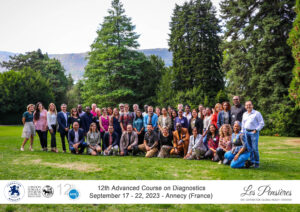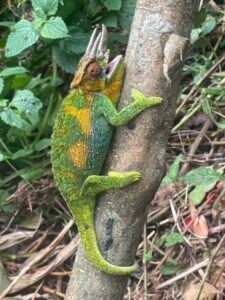I am writing this in the airport in Geneva waiting for my flight home from ACDx. This summer for my practicum, I had the pleasure of working with the Mérieux Foundation as they prepared for the 12th annual Advanced Course on Diagnostics (ACDx). This course brings together professionals from all over the world and different sectors, including research, clinical laboratories, policy and regulation, and biotechnology to discuss diagnostics. We had six days packed full of lectures, panel discussions, and workshops all hosted at Les Pensières in Annecy, France.
One of the many qualities that makes ACDx a special event is that it is relatively small. This year there were 25 participants, and a set of core faculty with several additional speakers who rotated throughout the week. We all stayed at Les Pensières Center for Global Health in Annecy, on the beautiful lake. This setting allowed us to build true connections, not only spending all day together learning but continuing those conversations over shared meals, walking along the lake, and exploring the town.

The core focus throughout the week is improving equitable access to diagnostics, especially in LMICs. It was a great demonstration of global public health in action. Colleagues from around the world were discussing the barriers to access to high quality and affordable diagnostics in their respective communities, and how to collaborate to build sustainable solutions to complex problems. Throughout the week we heard from experts at WHO, Africa CDC, ASLM, NIH, FIND, UNITAID, Fondation Merieux and more covering various topics in diagnostics from emerging technologies to laboratory system strengthening, regulatory harmonization, antimicrobial resistance, social innovation for public health, public health communications about diagnostics and One Health, and the implications of climate change on diagnostics. Honestly, my head is still spinning a bit from all the great talks we heard and conversations we had. I look forward to keeping in touch with the colleagues I met this week, and I hope to return to Annecy someday soon.
-Sophie

To learn more about ACDx, visit: https://www.fondation-merieux.org/en/events/12th-advanced-course-on-diagnostics-acdx/


